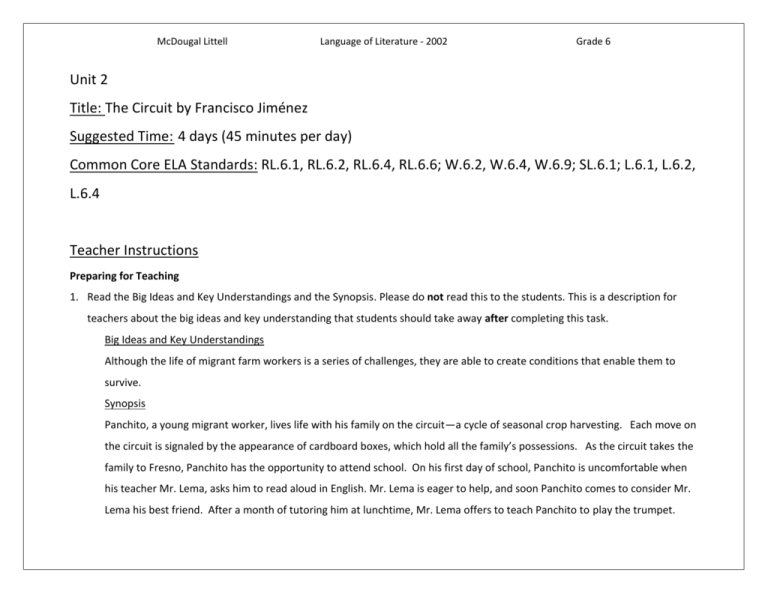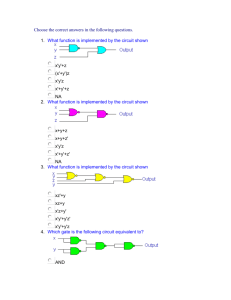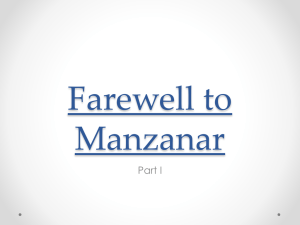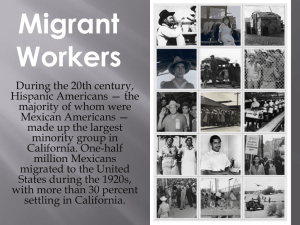Grade6_The Circuit_ML
advertisement

McDougal Littell Language of Literature - 2002 Grade 6 Unit 2 Title: The Circuit by Francisco Jiménez Suggested Time: 4 days (45 minutes per day) Common Core ELA Standards: RL.6.1, RL.6.2, RL.6.4, RL.6.6; W.6.2, W.6.4, W.6.9; SL.6.1; L.6.1, L.6.2, L.6.4 Teacher Instructions Preparing for Teaching 1. Read the Big Ideas and Key Understandings and the Synopsis. Please do not read this to the students. This is a description for teachers about the big ideas and key understanding that students should take away after completing this task. Big Ideas and Key Understandings Although the life of migrant farm workers is a series of challenges, they are able to create conditions that enable them to survive. Synopsis Panchito, a young migrant worker, lives life with his family on the circuit—a cycle of seasonal crop harvesting. Each move on the circuit is signaled by the appearance of cardboard boxes, which hold all the family’s possessions. As the circuit takes the family to Fresno, Panchito has the opportunity to attend school. On his first day of school, Panchito is uncomfortable when his teacher Mr. Lema, asks him to read aloud in English. Mr. Lema is eager to help, and soon Panchito comes to consider Mr. Lema his best friend. After a month of tutoring him at lunchtime, Mr. Lema offers to teach Panchito to play the trumpet. McDougal Littell Language of Literature - 2002 Grade 6 Elated by this offer, Panchito rushes home to tell his family, only to find that the boxes have been packed and the family will move once more. 2. Read the entire selection, keeping in mind the Big Ideas and Key Understandings. 3. Re-read the text while noting the stopping points for the Text Dependent Questions and teaching Tier II/academic vocabulary. During Teaching 1. Students read the entire selection independently. 2. Teacher reads the text aloud while students follow along or students take turns reading aloud to each other. Depending on the text length and student need, the teacher may choose to read the full text or a passage aloud. For a particularly complex text, the teacher may choose to reverse the order of steps 1 and 2. 3. Students and teacher re-read the text while stopping to respond to and discuss the questions, continually returning to the text. A variety of methods can be used to structure the reading and discussion (i.e., whole class discussion, think-pair-share, independent written response, group work, etc.) Text Dependent Questions Text-dependent Questions In the first paragraph on page 265, the narrator describes the strawberry sharecropper not smiling as “natural.” Use textual evidence to explain what he means by this. Revisit page 265 and 266. What do we learn about the narrator? Cite evidence from the text to support your Evidence-based Answers The author refers to Ito, the strawberry sharecropper not smiling as natural because the season has come to an end and there were less strawberries being picked. “The peak of the strawberry season was over and…the workers…were not picking as many boxes…...” (265). Ito was making less money and he knew that he would have to let his workers go. Panchito is the narrator. He works in the fields with his father and older brother. Strawberry season is over and Panchito and McDougal Littell Language of Literature - 2002 response. On page 265, Jimenez writes, “Suddenly I felt even more the weight of hours, days, weeks, and months of work.” How does the use of the word weight and the elements of time (eg. hours, days, weeks, months) emphasize the difficult life of migrant farm workers? When the narrator comes home from the strawberry fields, he notices that all of the family’s belongings are in boxes. Reread page 266 and explain the differing attitudes the family members have towards the move and reasons the author gives for why they feel this way. Reread the paragraph on page 266 that begins with “Papa parked the car….” What does this passage reveal about the life of migrant farmer workers and their families? Grade 6 his family are preparing to move again. “Yes, it was that time of year again….The thought of having to move to Fresno and knowing what was in store for me brought tears to my eyes.” (266) Panchito is not happy about moving to Fresno because he knows that the work of picking grapes is very difficult. The author goes from small increments of time to large increments of time “hours, days, weeks” creating a sense of a never-ending cycle. The use of the word weight emphasizes the heaviness and oppression experienced by migrant farm workers living on the circuit. Panchito is upset about moving because he understands the harsh work that is ahead of him with picking grapes. “The thought of moving to Fresno and knowing what was in store for me there bought tears to my eyes.” (266) Roberto appears to be more accepting of the move as he puts his head back and closes his eyes (266). Being the oldest child, Roberto is use to life on the circuit. The younger children are excited about the move and see it as an adventure. Because they are young, they do not understand the harsh realities of working in the fields. Both Mama and Papa have completely adapted to their lives as migrant farm workers. They have been through many moves and, for them; it’s simply part of life, a continuation of the cycle. Papa packs the car. Mama is focused on providing stability for her family as she has prepared a pot of beans so the family will have food to eat when they reach their new destination. The fact that Papa left the car running suggests that they were in a hurry. They were preparing to drive to farms in search of work and it was important to get an early in order to get available jobs. Roberto and Panchito begin to carry the boxes to the car “without saying a word” supports the idea that McDougal Littell Language of Literature - 2002 Grade 6 moving is a part of a familiar routine for migrant farm workers and their families. On page 267, the author refers to the garage as home. What actions do the family take to make it a home? What does this tell us about how the family faces challenges? On page 267, the author states, “Around nine o’clock the temperature had risen to almost one hundred degrees.” How does Panchito react to working under these conditions? Cite evidence from the text to support your response. What words does the author use to illustrate Papa’s reaction to seeing the school bus on page 268? What can we infer from his reaction? The garage is old and has no windows. The floors are loose dirt and the walls are weak because they are ridden with termites. During the night, the males fix the house to make it a home. Roberto sweeps the floor to the hard ground while Papa plugs the holes in the walls. The fact that the family is able to take the garage that “was worn out by the years” (267) and make it a home, exemplifies the families ability to make the best out of adverse situations. Working under such harsh conditions takes its toll on Panchito. By 9:00 am he was hot, sweaty and extremely thirsty. “I was completely soaked in sweat, and my mouth felt as if I had been chewing on a handkerchief.” (267) This is dangerous for Panchito because he is dehydrated. He finally gets water to drink but it makes him sick because he drinks too much. “I felt sick to my stomach….I dropped to my knees and let the jug roll off my hands.” (268) Panchito continues to work despite not feeling well. “I still felt a little dizzy when we took a break to eat lunch.” (268) The hard work continues to affect Panchito for days until he gets used to it. “The next morning I could hardly move…..This feeling went on every morning until my muscles finally got used to the work.” (268) Although the challenges of the working conditions impact Panchito physically, he must continue to work for the sake of his family. When Papa sees the school bus, the author uses the word pale to describe the color of Papa’s face. Papa is frightened that the school bus is coming because he knows that his sons should be in school. Papa “whispered loudly in alarm” (268) to inform the boys that the school bus is coming. The use of the word alarm McDougal Littell Language of Literature - 2002 Re-read page 268. What is Panchito’s attitude toward going to school? Cite evidence from the text to support your response. Grade 6 connotes the nervousness that Papa feels and how important it is for Panchito and Roberto to hide. When the school bus drives away Papa warns the boys to be careful; “Tienen que tener cuidado.” (268) The author uses Spanish here to emphasize how important it is to Papa for the boys to not be seen working during school hours. Panchito has mixed feelings about going to school. He is relieved that he does not have to go into the fields to work and that he can attend school with the other children his age. “I woke up early…savoring the thought of not going to work and of starting sixth grade for the first time that year.” (268) As Panchito gets out of bed and joins Papa and Roberto for breakfast, he has a difficult time looking at Roberto in the face because he knows that Roberto has to continue working in the fields instead of going to school. “He was not going to school today….He would not go until the cotton season was over, and that was sometime in February.” (268) The thought of this saddens Panchito because he knows how difficult it is to work in the field and he wants Roberto to have the same opportunity to attend school as he does. When Papa and Roberto head off to the fields to work, Panchito feels a sense of relief but that quickly changes when he arrives to school. “When the school bus stopped in front of the school, I felt very nervous.” (270) As he enters the school office, he is “startled” (270) when the woman in the office addresses him in English because he has been away from school for a while and he hasn’t had the opportunity to practice English. “Finally, after struggling for English words I managed to tell her that I wanted to enroll in the sixth grade.” (270) Panchito makes it to his new sixth grade class but his nervousness intensifies when Mr. Lema, his teacher, introduces him to the class. “I was so nervous and McDougal Littell Language of Literature - 2002 Grade 6 scared at that moment when everyone’s eyes were on me that I wished I were with Papa and Roberto picking cotton.” (270) On page 270 when Panchito enters the office on his first day of school he is startled when the woman speaks to him in English. “I had not heard English in months” (270). How has life as a migrant farm worker affected Panchito’s education? How does he work to overcome this challenge? On page 270, Panchito describes Mr. Lema as his best friend at school. How does Mr. Lema help Panchito deal with the challenges of his life on the circuit? Panchito is unable to read his English book when Mr. Lema, his new teacher asks him. “I opened the book to page 125…My mouth was dry…I could not begin.” He has been out of school for a while because he has been helping his family by working in the fields. He does not get the opportunity to practice his English often while he is working. He is desperate to improve his reading. “During recess I went into the restroom and opened my English book to page 125. I began to read in a low voice pretending that I was in class.” (270) He decides to give up his recess to practice. He even asks Mr. Lema to help him. Mr. Lema provides Panchito with the possibility of stability and a better life. Mr. Lema tutors Panchito in reading during lunch. “I asked him if he could help me with the new words. ‘Gladly,’ he said.” (270) The use of the word ‘gladly’ to describe Mr. Lema’s willingness to be helpful establishes the friendship between Mr. Lema and Panchito. Panchito is excited because his life as a migrant farm worker makes it difficult to make friends. Mr. Lema provides him with the stability that he longs for because of his life on the circuit. “The rest of the month I spent my lunch hours with Mr. Lema, my best friend at school.” (270) Panchito is excited because his life as a migrant farm worker makes it difficult to make friends. McDougal Littell Language of Literature - 2002 Grade 6 Meaning needs to be provided Meaning can be learned from context Tier II/Academic Vocabulary These words require less time to learn These words require more time to learn (They are concrete or describe an object/event/ process/characteristic that is familiar to students) (They are abstract, have multiple meanings, are a part of a word family, or are likely to appear again in future texts) 268-jot 267-clasped 267- strain 268- savor 265- sharecropper 266- store 266- jalopy 268-acid 266- detect 266- spelled 267- labor camp 267- populate 268- served 266-accompanied 266- galvanized 268&270 instinctively/instinctive 268-grade 270-enthusiastically McDougal Littell Language of Literature - 2002 Grade 6 Culminating Writing Task Prompt o Despite the challenges of working on the circuit, Panchito and his family remain strong. What challenges do Panchito and his family face working on the circuit? How do they deal with the challenges as individuals and collectively? Cite specific evidence from the text to support your response. o This paper requires literary analysis. Students should be encouraged to develop a strong claim and use evidence from the text to support it. Encourage students to elaborate on their evidence to show how the evidence supports their thesis statement. This paper can be assigned as an on-demand writing task or a process paper. Teacher Instructions 1. Students identify their writing task from the prompt provided. 2. Students complete an evidence chart as a pre-writing activity. Teachers should guide students in gathering and using any relevant notes they compiled while reading and answering the text-dependent questions earlier. Some students will need a good deal of help gathering this evidence, especially when this process is new and/or the text is challenging! Evidence Quote or paraphrase Panchito arrives home from a day of work to find all of his family’s belongings “neatly packed in cardboard boxes.” Panchito and Roberto help Papa load all of their belongings into “Carcanchita,” the family car that carries them from place to place in search of work. Page number 266 266 Elaboration / explanation of how this evidence supports ideas or argument Moving from place to place is one of the challenges presented by life on the circuit and Panchito is not happy that the boxes are packed once again. Although moving is one of the most difficult aspects of living on the circuit, everyone in Panchito’s family pitches in to make the move as smooth as possible. McDougal Littell Language of Literature - 2002 “The garage was worn out by the years.” 267 “That night, by the light of the kerosene lamp, we unpacked and cleaned our new home” (267). 267 “Around nine o’clock the temperature had risen to almost one hundred degrees” 267 Panchito pours water over his face and neck to cool himself off. 267 “I opened the book to page 125…My mouth was dry…I could not begin.” 270 “During recess I went into the restroom and opened my English book to page 125. I began to read in a low voice pretending that I was in class.” 270 Grade 6 As migrant farm workers, Panchito and his family find themselves living under harsh conditions. The family works together to make the best of the dilapidated garage. The sweltering temperatures are a factor that Panchito, Roberto and Papa combat while picking grapes in the vineyard. Panchito does not succumb to the challenges of picking grapes in one hundred degree heat. He uses the water to cool himself off so that he can return to work. He knows that his family is depending on him. Because Panchito is constantly moving, his school attendance is not consistent. He has not practiced English in so long that when his teacher asks him to read for the class, he is unable. Panchito is determined to improve his reading. During his recess, he takes the initiative to practice reading ultimately asking his teacher, Mr. Lema, for help. 3. Once students have completed the evidence chart, they should look back at the writing prompt in order to remind themselves what kind of response they are writing (i.e. expository, analytical, argumentative) and think about the evidence they found. (Depending on the grade level, teachers may want to review students’ evidence charts in some way to ensure accuracy.) From here, students should develop a specific thesis statement. This could be done independently, with a partner, small group, or the entire class. Consider directing students to the following sites to learn more about thesis statements: http://owl.english.purdue.edu/owl/resource/545/01/ OR http://www.indiana.edu/~wts/pamphlets/ thesis_statement.shtml. McDougal Littell Language of Literature - 2002 Grade 6 4. Students compose a rough draft. With regard to grade level and student ability, teachers should decide how much scaffolding they will provide during this process (i.e. modeling, showing example pieces, sharing work as students go). 5. Students complete final draft. Sample Answer The lives of migrant farm workers can be full of challenges. The constant moving in search for work can create a life that lacks stability. The Circuit by Francisco Jimenez provides a look into the life of a migrant farm worker family and the struggles that they face. Young Panchito, along with his family, work as migrant farm workers in the California Central Valley. Despite the ongoing difficulty of life on the circuit, Panchito and his family are able to come together and create a life that is filled with love and stability. The story opens as the strawberry season is coming to an end. Panchito is saddened by the fact that he and his family will be leaving the farm. When Ito signals the end of the day, Panchito realizes that this is the last time that he will hear that signal. “Those were the words that I waited to hear twelve hours a day, every day, seven days a week…..And the thought of not hearing them again saddened me.” (266) Although Panchito works in the field with his father and brother Roberto in sweltering weather, being on the farm has provided him with a sense of stability; something that can be difficult to achieve living on the circuit. Panchito continues to feel the impact of the looming move when he arrives home from a day of work to find all of his family’s belongings “neatly packed in cardboard boxes.” (266) Despite the uneasiness Panchito is feeling about the move and the search for work, Panchito and his family work together to face this challenge. Panchito and Roberto help Papa load all of their belongings into “Carcanchita,” the family car that carries them from place to place in search of work. Mama has prepared a pot of beans in her special pot, “mi olla,” so when they reach their new home, they will have a prepared meal. As Panchito and his family make their way through the McDougal Littell Language of Literature - 2002 Grade 6 Central Valley stopping at labor camps in search of work, it is Mama who uses her ability to speak English to deal with the foreman. “Since Papa did not speak English, Mama asked the camp foreman if he needed any more workers” (267). Mama’s boldness along with her English secures their next job and living quarters. “She rang the doorbell…a tall husky man came out.” (267) After Mama exchanged words with the man she came back to the car and excitedly exclaimed, “ We have work…we can stay there the whole season.”(267) Although the family is lucky to find work, their new home is less than inviting. The garage that will serve as their home while they work at the labor camp is an old dilapidated garage with holes in the walls from where the termites had eaten through. Panchito and his family live under harsh conditions at the labor camp, yet everyone in the family contributes to making their new living quarters more home-like. “That night, by the light of the kerosene lamp, we unpacked and cleaned our new home.” (267) The work that Papa does to fill the holes in the wall and Roberto’s help with sweeping the floor helps to make the challenging living conditions tolerable. Panchito, Roberto and Papa work under unbearable heat picking grapes during the summer months to support their family. Panchito falls victim to the hundred-degree temperature. “I was completely soaked in sweat, and my mouth felt as if I had been chewing on a handkerchief.” (267) He passes out while working after drinking water too quickly but it isn’t until lunch that he is able to take a break. For the sake of his family, Panchito works through the challenge presented by the heat. “After lunch we went back to work. The sun kept beating down.” (268) Instead of succumbing to the heat exhaustion, Panchito pours water over his face and neck to cool himself off. After working all day in the field under grueling circumstances, Mama makes sure that she has a nice meal prepared for them. “Mama had cooked a special meal for us. We had rice and tortillas with carne con chile, my favorite dish.” (268) Despite the challenges of the working day, Panchito is content having a meal with his family. McDougal Littell Language of Literature - 2002 Grade 6 Because of their life on the circuit, Panchito and Roberto are unable to attend school regularly like most kids their age. As they work in the vineyard, they hide when they see a school bus approaching because they do not want to get in trouble for not going to school. Panchito notices “two neatly dressed boys” (268) his age getting off of the bus. Panchito longs for the day that he can go back to school. When Panchito is finally able to attend school he has mixed feelings. He is relieved that he has the opportunity to leave the field and continue with his studies but he is conflicted because he knows Roberto will not be able to return to school until the cotton season is over (268). Panchito makes his way to school but he is startled when the woman in the office speaks in English. He realizes that has been away from school for a while. In class, he is unable to read his English book when asked by his teacher Mr. Lema because he has missed so much school. Panchito is determined to catch up on his reading. “During recess I went into the restroom and opened my English book to page 125. I began to read in a low voice pretending that I was in class.” (270) He also takes the initiative by asking Mr. Lema to tutor him during lunch. Mr. Lema is happy to help him. Panchito is excited to have found a friend in Mr. Lema since making friends can be difficult because he is constantly moving. Panchito works to improve his studies and has also made a connection with Mr. Lema. Unfortunately the life of the circuit and as the story closes Panchito has to face the packed cardboard boxes once again. Panchito and his family endure many hardships as they travel the circuit in search of work. The constant moving, the substandard living conditions, and the harsh working conditions add to the pressure of the migrant lifestyle. On the circuit, it can be difficult to take advantage of educational opportunities with any degree of consistency. Through all of these struggles and hardships the family is the one constant and by working together and providing support, they can overcome the obstacles presented by the circuit. McDougal Littell Language of Literature - 2002 Grade 6 Additional Tasks What do the car and the cooking pot symbolize in the story? How does this help us understand the characters of Papa and Mama? Answer: The car represents the hope for a better life for Papa. He sees the blue necktie in the back seat and assumes that it belonged to a man who did not work as a laborer to support his family. The car symbolizes a better life for Papa and his family. He feels that since the previous owner was a man who wore a tie to work, he did not have to endure the challenging work of the field to support his family. The car represents the hope that he has for a better life for his family. The pot symbolizes stability. The pot allows Mama to prepare meals for her family after they complete a hard day of work in the fields. “We then sat down to eat dinner around some wooden crates that served as a table. Mama had cooked a special meal for us.” (268) Mama wants to provide a home and a semblance of stability for her family despite their circumstance. The author uses the metaphor of the boxes to begin and end the story “The Circuit.” Explain the purpose of the boxes and the connection to the circuit with valid reasoning and relevant and sufficient evidence from the text. Answer: The harvest season for the farming community offers employment for those who are willing to endure the rigors and difficulties of picking the crops. This cycle of moving from farm to farm in search of seasonal work is referred to as “the circuit.” The narrator opens the story with Panchito’s family having all of their belongings packed to go to the next farm to look for work. “Yes, it was that time of year. When I opened the front door to the shack, I stopped. Everything we owned was neatly packed in cardboard boxes. Suddenly I felt the weight of hours, days, weeks.”(266) When Panchito sees the packed cardboard boxes, he knows that it is time to move and the challenging work of picking grapes awaits him in Fresno. The boxes represent the family’s home and they carry their home with them from job to job. After grape season is over, Panchito returns to school. He connects with Mr. Lema, his teacher who helps him practice his reading. The ongoing cycle of McDougal Littell Language of Literature - 2002 Grade 6 the circuit continues when Panchito comes home excited to share the news about music lessons with Mr. Lema only to see the neatly packed boxes. “I thought they were happy to see me, but when I opened the door to our shack, I saw that everything we owned was neatly packed in cardboard boxes.” (271) Note to Teacher During this lesson, students could discuss the questions in pairs or small groups followed by whole group discussion. If students are not familiar with migrant farm workers and the seasonal trips that they make to find work, provide a brief overview. This should be done after they read the story and if they still have questions. After unpacking the text, you may want to inform students that this story is based on the life of the author, Francisco Jimenez who grew up working in the fields of California. For more information on the life of the author, visit http://www.scholastic.com/teachers/article/francisco-jimenez-interview-transcript. McDougal Littell Language of Literature - 2002 Name __________________________________________ Grade 6 Date _________________ “The Circuit” 1. In the first paragraph on page 265, the narrator describes the strawberry sharecropper not smiling as “natural.” Use textual evidence to explain what he means by this. 2. Revisit page 265 and 266. What do we learn about the narrator? Cite evidence from the text to support your response. 3. On page 265, Jimenez writes, “Suddenly I felt even more the weight of hours, days, weeks, and months of work.” How does the use of the word weight and the elements of time (e.g. hours, days, weeks, months) emphasize the difficult life of migrant farm workers? 4. When the narrator comes home from the strawberry fields, he notices that all of the family’s belongings are in boxes. Reread page 266 and explain the differing attitudes the family members have towards the move and reasons the author gives for why they feel this way. McDougal Littell Language of Literature - 2002 Grade 6 5. Reread the paragraph on page 266 that begins with “Papa parked the car….” What does this passage reveal about the life of migrant farmer workers and their families? 6. On page 267, the author refers to the garage as home. What actions do the family take to make it a home? What does this tell us about how the family faces challenges? 7. On page 267, the author states, “Around nine o’clock the temperature had risen to almost one hundred degrees.” How does Panchito react to working under these conditions? Cite evidence from the text to support your response. 8. What words does the author use to illustrate Papa’s reaction to seeing the school bus on page 268? What can we infer from his reaction? 9. Re-read page 268. What is Panchito’s attitude toward going to school? Cite evidence from the text to support your response. McDougal Littell Language of Literature - 2002 Grade 6 10. On page 270 when Panchito enters the office on his first day of school he is startled when the woman speaks to him in English. “I had not heard English in months” (270). How has life as a migrant farm worker affected Panchito’s education? How does he work to overcome this challenge? 11. On page 270, Panchito describes Mr. Lema as his best friend at school. How does Mr. Lema help Panchito deal with the challenges of his life on the circuit?








